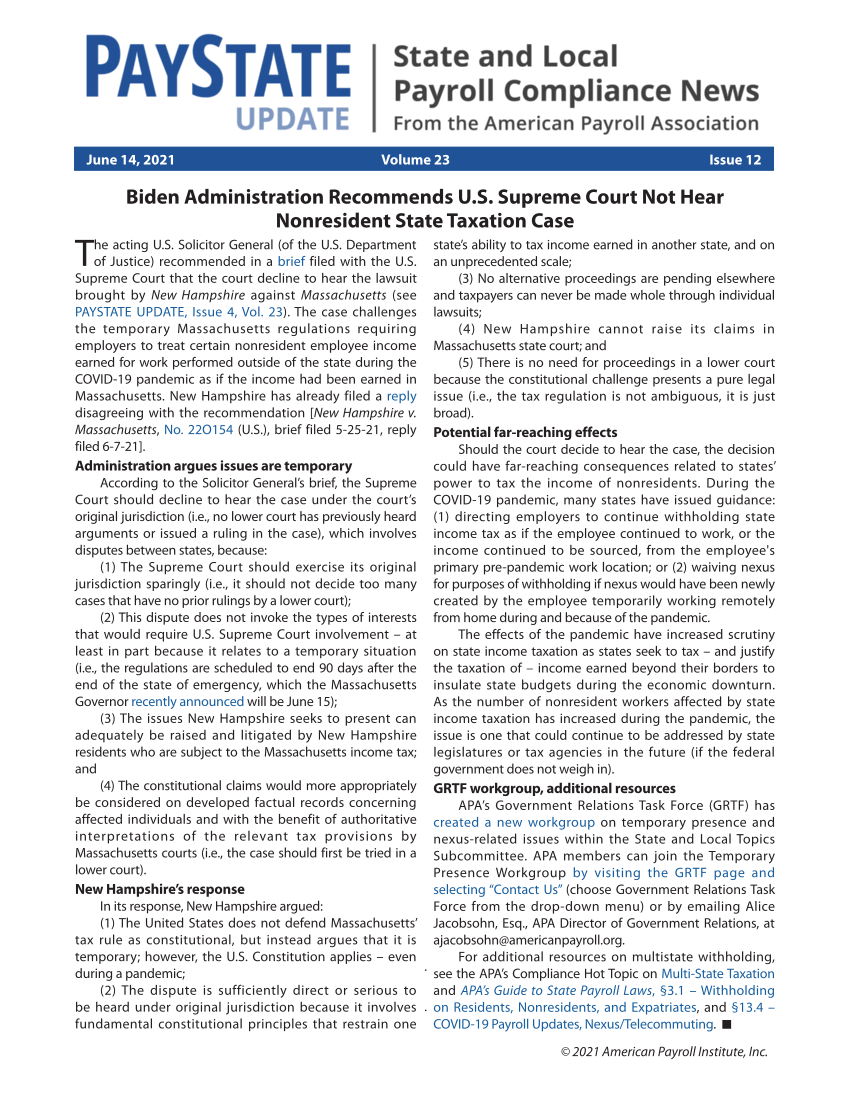© 2021 American Payroll Institute, Inc. Biden Administration Recommends U.S. Supreme Court Not Hear Nonresident State Taxation Case The acting U.S. Solicitor General (of the U.S. Department of Justice) recommended in a brief filed with the U.S. Supreme Court that the court decline to hear the lawsuit brought by New Hampshire against Massachusetts (see PAYSTATE UPDATE, Issue 4, Vol. 23). The case challenges the temporary Massachusetts regulations requiring employers to treat certain nonresident employee income earned for work performed outside of the state during the COVID-19 pandemic as if the income had been earned in Massachusetts. New Hampshire has already filed a reply disagreeing with the recommendation [New Hampshire v. Massachusetts, No. 22O154 (U.S.), brief filed 5-25-21, reply filed 6-7-21]. Administration argues issues are temporary According to the Solicitor General’s brief, the Supreme Court should decline to hear the case under the court’s original jurisdiction (i.e., no lower court has previously heard arguments or issued a ruling in the case), which involves disputes between states, because: (1) The Supreme Court should exercise its original jurisdiction sparingly (i.e., it should not decide too many cases that have no prior rulings by a lower court) (2) This dispute does not invoke the types of interests that would require U.S. Supreme Court involvement – at least in part because it relates to a temporary situation (i.e., the regulations are scheduled to end 90 days after the end of the state of emergency, which the Massachusetts Governor recently announced will be June 15) (3) The issues New Hampshire seeks to present can adequately be raised and litigated by New Hampshire residents who are subject to the Massachusetts income tax and (4) The constitutional claims would more appropriately be considered on developed factual records concerning affected individuals and with the benefit of authoritative interpretations of the relevant tax provisions by Massachusetts courts (i.e., the case should first be tried in a lower court). New Hampshire’s response In its response, New Hampshire argued: (1) The United States does not defend Massachusetts’ tax rule as constitutional, but instead argues that it is temporary however, the U.S. Constitution applies – even during a pandemic (2) The dispute is sufficiently direct or serious to be heard under original jurisdiction because it involves fundamental constitutional principles that restrain one state’s ability to tax income earned in another state, and on an unprecedented scale (3) No alternative proceedings are pending elsewhere and taxpayers can never be made whole through individual lawsuits (4) New Hampshire cannot raise its claims in Massachusetts state court and (5) There is no need for proceedings in a lower court because the constitutional challenge presents a pure legal issue (i.e., the tax regulation is not ambiguous, it is just broad). Potential far-reaching effects Should the court decide to hear the case, the decision could have far-reaching consequences related to states’ power to tax the income of nonresidents. During the COVID-19 pandemic, many states have issued guidance: (1) directing employers to continue withholding state income tax as if the employee continued to work, or the income continued to be sourced, from the employee's primary pre-pandemic work location or (2) waiving nexus for purposes of withholding if nexus would have been newly created by the employee temporarily working remotely from home during and because of the pandemic. The effects of the pandemic have increased scrutiny on state income taxation as states seek to tax – and justify the taxation of – income earned beyond their borders to insulate state budgets during the economic downturn. As the number of nonresident workers affected by state income taxation has increased during the pandemic, the issue is one that could continue to be addressed by state legislatures or tax agencies in the future (if the federal government does not weigh in). GRTF workgroup, additional resources APA’s Government Relations Task Force (GRTF) has created a new workgroup on temporary presence and nexus-related issues within the State and Local Topics Subcommittee. APA members can join the Temporary Presence Workgroup by visiting the GRTF page and selecting “Contact Us” (choose Government Relations Task Force from the drop-down menu) or by emailing Alice Jacobsohn, Esq., APA Director of Government Relations, at ajacobsohn@americanpayroll.org. For additional resources on multistate withholding, see the APA’s Compliance Hot Topic on Multi-State Taxation and APA’s Guide to State Payroll Laws, §3.1 – Withholding on Residents, Nonresidents, and Expatriates, and §13.4 – COVID-19 Payroll Updates, Nexus/Telecommuting. June 14, 2021 Volume 23 Issue 12
Printed for: PayrollOrg Bookshelf © 2024 American Payroll Institute, Inc. All Rights reserved. From: PayrollOrg Digital Publications (bookshelf.payroll.org)







